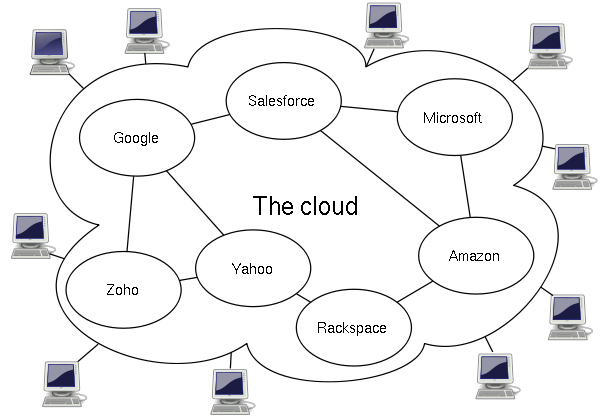Relevant Technologies In Cloud Computing
- Cloud access devices
- Browser's and thin clients
- High-speed broadband access
- Data centers and server farms
- Storage devices
 |
| Fig 1-1 Relevant Technologies In Cloud Computing with Data Centers and Server Farms https://amarjondhalekar.blogspot.com |
1. Cloud access devices
The range of access devices for the cloud has expanded in recent years. Home PCs, enterprise PCs, network computers, mobile phone devices, custom handheld devices, and custom static devices (including refrigerators) are all online. Interestingly, the growth of the iPhone and the proliferation of applications available from its App Store illustrate an improvement in terms of access to the cloud. This greater access is resulting in greater use and growth of services within the cloud. For example, you can now use Skype through the iPhone, thus bringing this peer-to-peer network much closer to users, and Salesforce.com has introduced an application that allows users to access its services from the iPhone, as well as many other vendors.
2. Browser's and thin clients
Users of multiple device types can now access applications and information from wherever they can load a browser. Indeed, browsers are becoming increasingly sophisticated. Enterprise applications, such as SAP and Oracle, can be accessed through a browser interface—a change from when a client (a so-called “fat”) application needed to be loaded onto the desktop. The general population has become more familiar with the browser function and can use a discrete application, where the context is intuitive, without requiring training or user guides.
3. High-speed broadband access
A critical component of the cloud is the broadband network, which offers the means to connect components and provides one of the substantial differences from the utility computing concept of 30 years ago. Broadband access is now widely available, especially in global metropolitan areas. Nearly pervasive wireless access (e.g., WiFi, cellular, emerging WiMAX) is available, which has established mobile devices as entry points to the IT resources of the enterprise and the cloud.
4. Data centers and server farms
Cloud-based services require large computing capacity and are hosted in data centers and server farms. These distributed data centers and server farms span multiple locations and can be linked via internetworks providing distributed computing and service delivery capabilities.
Several examples today illustrate the flexibility and scalability of cloud computing power. For instance, Google has linked a very large number of inexpensive servers to provide tremendous flexibility and power. Amazon’s Elastic Compute Cloud (EC2) provides virtualization in the data center to create huge numbers of virtual instances for services being requested. Salesforce.com provides SaaS to its large customer base by grouping its customers into clusters to enable scalability and flexibility.
5. Storage devices
Decreasing storage costs and the flexibility with which storage can be deployed have changed the storage landscape. The fixed direct access storage device (DASD) has been replaced with storage area networks (SANs), which have reduced costs and allowed a great deal more flexibility in enterprise storage. SAN software manages the integration of storage devices and can independently allocate storage space on-demand across several devices.
Good Work.
ReplyDeletesdfvsdcfv
ReplyDeleteIf you like our content then it's good for us. Thankyou for reaching us.
DeleteProduction and selling of any product should focus on customer needs. The specialist helps businesses to identify marketing drives that makes the customer feel at home with the product. I recommend you to visit qviscomm.com.au
ReplyDeleteCloud computing is about sharing resources rather than owning them, but have you considered the security issues involved? Read this guide from Verizon for more information on cloud computing security
ReplyDeleteMany individuals erroneously trust it is innovation which drives development. However from the definitions over, that is obviously not the situation. Bitrss best cryptocurrency investment
ReplyDeleteOracle Financials Cloud training will provide an indepth understanding of your applications, including Accounting Hub, General Ledger, Payables, Receivables and Revenue Management and teach you how to setup, administer and use your Financials Cloud applications.
ReplyDeleteThere are various categories Oracle Financials Cloud training which is mentioned below:
Oracle Accounting Hub Cloud Training
Oracle General Ledger Cloud Training
Oracle Payables Cloud Training
oracle fusion financials online training
Oracle Receivables and Collection Cloud Training
Oracle Revenue Management Cloud Training
Oracle Financial Reporting Cloud Training
Complete Customization of Oracle Financials Cloud training’s course content is possible for Individual students and for Corporate. Oracle Financials Cloud online training is available for individuals and for corporate we may arrange the classroom as well. For more information on Oracle Financials Cloud training do connect us.
Email: contact@maxmunus.com
Call / WhatsApp: +919035888988